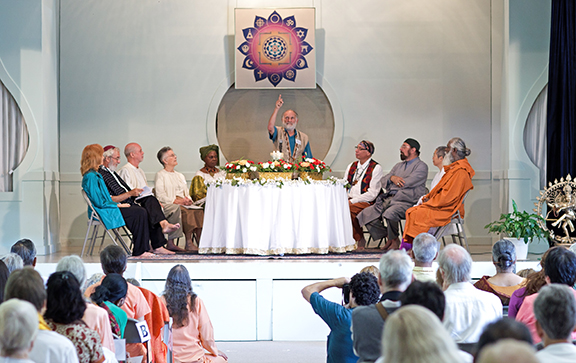 Swami Satchidananda initiated the tradition of celebrating all the great spiritual teachers of every faith during each Guru Poornima celebration. In this same spirit, we include this essential teaching of his regarding the essential unity of all spiritual wisdom.
Swami Satchidananda initiated the tradition of celebrating all the great spiritual teachers of every faith during each Guru Poornima celebration. In this same spirit, we include this essential teaching of his regarding the essential unity of all spiritual wisdom.
Even though every religion is a faith, we don’t call every faith a religion. But wherever you have faith, there is religion. Without faith, there is no religion.
Whether a person is called religious or not, we seem to be looking for the same thing which is happiness. Everyone and everything in this creation, including animals and plant life, is looking for happiness. Ask anybody: “Why are you doing this? What are you looking for? What are your aims?” Ultimately, they will give you the same answer: I just want to be happy. If you ask someone why they want to become a multimillionaire, or why they want to make themselves beautiful, or climb the corporate ladder, the answer is the same: “I want to be happy.” If you put a plant in a dark corner it won’t be happy there. It will strain and bend toward the light because it wants to be happy.
There is a similar underlying principle behind all the various faiths and religions. My understanding is that God is happiness. The Hindus have given God the name “Brahman.” Brahman is Supreme Bliss, unending permanent happiness. If we could accept the fact that we are all looking for one thing, and that thing is happiness, then we’ll know we are all searching for the same thing. And if that happiness could be called God, then we are all spiritual people. We are all looking for God. That is the fundamental goal behind any faith or religion.
From time immemorial, people have been looking for happiness, searching all over with the thought that they can be happy by amassing a lot of money, name, fame, making themselves beautiful or getting a few medals, or getting nominated for a special prize. But unfortunately, even with all that, they have not found permanent happiness; they have only found temporary happiness. As soon as you get something, within a few minutes you are worried about losing it. Even if you don’t have the anxiety of losing it, you still don’t seem to be happy for very long. After a few weeks or months it becomes stale, old, and you want to change it. You get a new shirt and you are happy with it until you see another one that seems nicer. You are continually looking for something bigger and better.
The moment you begin to say that you’re sick and tired of running after things, you become a seeker. First, you become a “sicker” and then, you become a seeker. When you become sick and tired of looking for temporary happiness, you begin to seek for permanent happiness. The only other place to look is within. When you look within, ultimately you will find your permanent happiness. That looking within is what you call religion. Religion means “to get back to” because the root in Latin is, “to return.”
Religion is similar to refinement. All the holy people, Self-realized people, are called refined people. One has to refine oneself. This means that you have returned to your fineness. Why should you return? First you were fine and then you became de-fined. Originally, every soul was made in God’s own image. If you accept that God is fine and we are the image of God, then we must also be fine.
But the problem is that we forget that, so we look for something to make us fine and happy. The minute you do something to make yourself fine, you are de-fining yourself. You were fine, then you de-fined yourself and now it’s time to refine. Every individual has definitions. Suppose I ask the question, “Who are you?” All your answers begin with the phrase, “I am”—I am so and so. I am a man, I am a woman, I am American, I am white, I am black, I am a yogi. I am happy or unhappy. Each one is a different definition, but the answer is presented in the same way. The common part of the answer is “I am.”
We are all one in the “I am.” That is the original fine thought. That’s what religion, spirituality, and faith are about—remembering that we are all “I ams” and we are fine! The moment we forget that, and we identify with the other half of the answer, then we are de-fined. Then, we become different from one another. We are all one in the first half—the better half. We are many in the other half. There is nothing wrong with that other half because we need to have variety. But always remember the essential oneness of “I am.”

